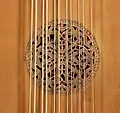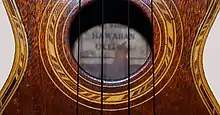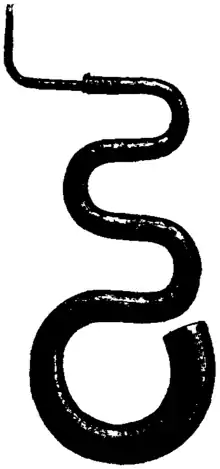Rosette (music)
A rosette (from French, meaning little rose), rose, or knot,[1] in the context of musical instruments, is a form of soundhole decoration. The name originated during the medieval period, as a comparison with church windows which were called rose windows. On the oud they are called by the Arabic language term shams, meaning sun. [2][3][4][5]
History
From the medieval to the baroque periods, it was common to have ornately carved soundhole designs, called roses. These were either carved directly into the wood of the soundboard or inserted from behind and made of carved wood or parchment. [6][7][8][9][10]The designs used for lutes and other early instruments were often inspired by the geometric patterns in Islamic art, probably from those used on the oud. During the medieval period, most such designs were 4-sided, whereas during the renaissance and baroque periods, 6-sided designs were used. [11]
 Baroque guitar soundhole with inserted wooden rose and inlaid rosette (1700).
Baroque guitar soundhole with inserted wooden rose and inlaid rosette (1700). A carved rose on a mandora from 1726.
A carved rose on a mandora from 1726. Baroque guitar soundhole with multi-layered parchment rose from behind, surrounded by inlaid rosette (1630).
Baroque guitar soundhole with multi-layered parchment rose from behind, surrounded by inlaid rosette (1630). Baroque mandolin with inserted rose made from ivory.
Baroque mandolin with inserted rose made from ivory.
Modern usage
During the romantic and classical periods in western music, the carved ornate soundhole roses went out of fashion and were replaced by open soundholes surrounded by inlaid decoration, commonly called rosettes. This style is still used today on classical and acoustic guitars. [12][13][14][15][16]Modern rosettes can be made of wood or plastic. Roses inserted from behind are still used on Ouds, Lavtas, Laoutos and other modern lutes. Decorative inserted roses are also sometimes used in modern times on electro-acoustic instruments, to prevent feedback. [17]
_soundhole_rosette.jpg.webp) Rosette on Romantic guitar (1890s).
Rosette on Romantic guitar (1890s)..jpg.webp) close-up view of rosette on modern classical guitar.
close-up view of rosette on modern classical guitar. Ukulele soundhole rosette
Ukulele soundhole rosette%252C_Cairo%252C_Egypt%252C_2009_-_MIM_PHX.jpg.webp) Egyptian oud with common triple soundhole shams (rose) design.
Egyptian oud with common triple soundhole shams (rose) design. Close-up of oud shams
Close-up of oud shams Modern bouzouki with inlaid rosette and scratch plate.
Modern bouzouki with inlaid rosette and scratch plate.
References
- "Rose". Grove Music Online (8th ed.). Oxford University Press. 2001.
- "middle eastern music: oud, ud or arabic lute". Belly-dance.org. Retrieved 23 March 2019.
- "The Stringed Instrument Database: Index". Stringedinstrumentdatabase.aornis.com. Retrieved 23 March 2019.
- "ATLAS of Plucked Instruments". Atlasofpluckedinstruments.com. Retrieved 23 March 2019.
- John Downing. "A Geometrical Analysis of an Old Nahat Oud" (PDF). Fomrhi.org. Retrieved 23 March 2019.
- luthsearch. "Carving the Lute Rose - Search Article Abstracts". Retrieved 23 March 2019.
- "Lute Roses". Gamut Music. Inc. Retrieved 23 March 2019.
- FVL, WP-Admin (30 December 2012). "Lute Top Replacement: Carving the Rosette". Retrieved 23 March 2019.
- "Recent Instruments". Mateus-lutes.com. Retrieved 23 March 2019.
- "Rose". Guitarandlute.com. Retrieved 23 March 2019.
- "Building a medieval lute, building early instruments". Cincinnatiearlymusic.com. Retrieved 23 March 2019.
- "Guitar Rosettes, Abalone and MOP Dots and Strips, DukeLuthier.com". Dukeluthier.com. Retrieved 23 March 2019.
- "Rosette Guitar Products". Rosette Guitar Products. Retrieved 23 March 2019.
- "Rosettes". Lmii.com. Retrieved 23 March 2019.
- "Guitar Rosettes - Lee Valley Tools". Leevalley.com. Retrieved 23 March 2019.
- Woodworks, Westfarthing (3 July 2016). "Guitar Rosette". Westfarthing Woodworks. Retrieved 23 March 2019.
- "Lute Hole Products - about us". Lutehole.com. Retrieved 23 March 2019.
